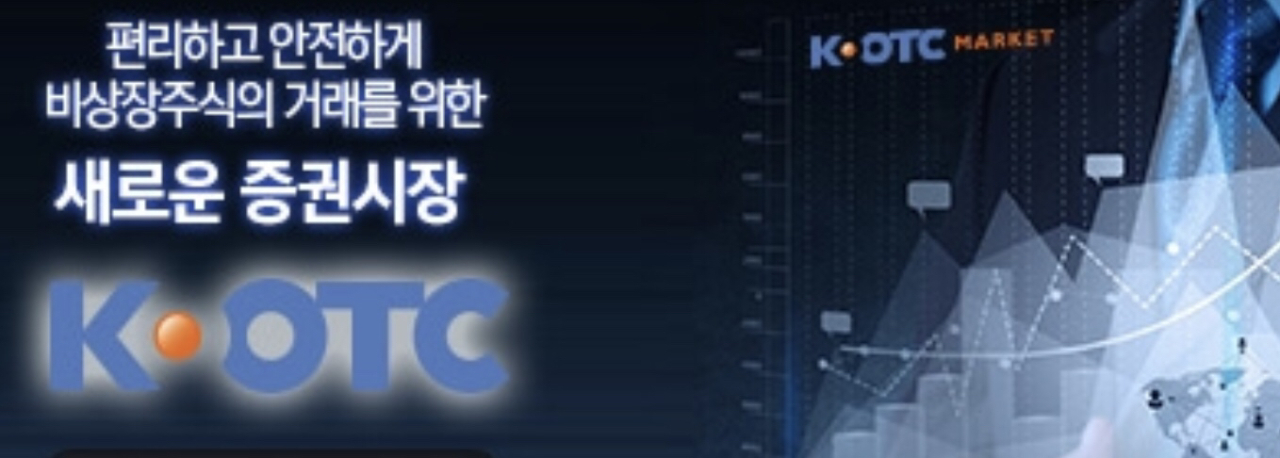[News Focus] Unlisted stock market gains momentum with attention to startups
Interest in unlisted stocks is projected to further grow as there are no other alternatives to Kosdaq and Konex
By Jung Min-kyungPublished : Dec. 4, 2019 - 10:56
With stocks on major bourses failing to satisfy the appetite of South Korean investors and brokerages, the unlisted securities market has been gaining high popularity, buoyed by growing interest in startups.
Unlisted stocks largely remained a foreign concept for domestic investors until 2014, when the Korea Financial Investment Association upgraded and rebranded its over-the-counter trading platform Freeboard -- which was launched in 2005 -- to K-OTC.
OTC markets around the globe serve as a platform for firms that are unable to meet the listing requirements of official exchanges such as Kospi or Kosdaq. Such firms issue unlisted stocks to raise capital, with investors who are ready to wield a double-edged sword of high risks and high returns.
Despite the risks that are magnified with unlisted stocks compared to its listed counterparts, K-OTC’s daily trading volume hit a record high of 15.8 billion won ($13.4 million) on Nov. 5, according to its operator KOFIA. Its accumulated volume of transactions has already surpassed the 2 trillion won mark as of Sept. 20.
Unlisted stocks largely remained a foreign concept for domestic investors until 2014, when the Korea Financial Investment Association upgraded and rebranded its over-the-counter trading platform Freeboard -- which was launched in 2005 -- to K-OTC.
OTC markets around the globe serve as a platform for firms that are unable to meet the listing requirements of official exchanges such as Kospi or Kosdaq. Such firms issue unlisted stocks to raise capital, with investors who are ready to wield a double-edged sword of high risks and high returns.
Despite the risks that are magnified with unlisted stocks compared to its listed counterparts, K-OTC’s daily trading volume hit a record high of 15.8 billion won ($13.4 million) on Nov. 5, according to its operator KOFIA. Its accumulated volume of transactions has already surpassed the 2 trillion won mark as of Sept. 20.

As of now, unlisted stocks of 136 firms are traded on K-OTC with its combined market cap valued at nearly 16 trillion won. The market cap has grown by nearly 25 times compared to the corresponding figure of 620 billion won in 2014, when the market was first established.
Analysts say that the global trend revolving around unicorn companies -- startups with a value of over $1 billion -- has fueled Korean investors’ interest in local unlisted stocks.
Some of the largest unicorns include global shared workspace provider WeWork and Elon Musk’s commercial space and aerospace firm SpaceX.
“Interest in unlisted stocks is projected to further grow as there are no other alternatives to Kosdaq and Konex, which used to provide fresh options for investors,” Hwang Se-woon, a senior researcher at Korea Capital Market Institute said.
“Demand for unlisted stocks in likely to increase at a stable pace in line with the growing interest in startups,” he added.
Reflecting the preference for startups, the most popular firms trading on the K-OTC market include webhosting firm Cafe24, online game PlayerUnknown’s Battlegrounds developer Krafton and privately held biopharmaceutical company Vivozon.
Alongside venture capital firms and investors who are driving the local OTC market, brokerages and tech firms have been launching private online trading platforms in KOFIA’s footsteps to boost competition and invigorate the market.
Securities and IT firms are joining hands to design a platform that could combat the issue of “information asymmetry” -- which blocks buyers from learning necessary information related to unlisted shares and increases security risks in transactions.
Unlike listed shares on official exchanges -- which requires candidates to meet market capitalization thresholds in order to finalize their initial public offering -- unlisted firms are not required to reveal their financial health to investors. This means that they may even be undercapitalized.
Last month, Dunamu, an operator of global cryptocurrency exchange Upbit, jointly launched an OTC platform with Samsung Securities and big data analytics company Deep Search. The platform dubbed U-Stockplus, available as a mobile app, aims to reduce risks for investors through its big data technology.
Yuanta Securities is the first among its peers to launch an OTC platform for unlisted stocks. The platform currently has around 162 firms trading on the market. It recently said it would upgrade it to provide information on the firms, including financial statements and investor relations.
Riding on the trend, the nation’s state-backed IT firm Koscom plans to jointly launch an OTC platform with major commercial lender KEB Hana and its brokerage sister Hana Financial Investment, next year. It plans to adopt blockchain technology, which would contribute to safe transactions between buyers and sellers, the firm said.
On top of everything, regulator Financial Services Commission revealed a set of measures, including investment vehicles, that would further revitalize VC investments in startups and unlisted firms. They would be adopted by the first-half of 2020, according to the FSC.
Adoption of an investment vehicle, called a “Business Development Company” will require more than 60 percent of total assets to be set aside for investments in unlisted firms with a market cap of less than 200 billion won.
However, investors must not rush to invest in unlisted stocks, despite some fresh opportunities that the OTC market can provide, according to KCMI analyst Hwang.
“Investors must not invest in unlisted stocks without being careful. They must not be fooled by temptations of unverified information.”
By Jung Min-kyung (mkjung@heraldcorp.com)








![[Graphic News] More Koreans say they plan long-distance trips this year](http://res.heraldm.com/phpwas/restmb_idxmake.php?idx=644&simg=/content/image/2024/04/17/20240417050828_0.gif&u=)
![[KH Explains] Hyundai's full hybrid edge to pay off amid slow transition to pure EVs](http://res.heraldm.com/phpwas/restmb_idxmake.php?idx=644&simg=/content/image/2024/04/18/20240418050645_0.jpg&u=20240419100350)






![[From the Scene] Monks, Buddhists hail return of remains of Buddhas](http://res.heraldm.com/phpwas/restmb_idxmake.php?idx=652&simg=/content/image/2024/04/19/20240419050617_0.jpg&u=20240419175937)

![[KH Explains] Hyundai's full hybrid edge to pay off amid slow transition to pure EVs](http://res.heraldm.com/phpwas/restmb_idxmake.php?idx=652&simg=/content/image/2024/04/18/20240418050645_0.jpg&u=20240419100350)

![[Today’s K-pop] Illit drops debut single remix](http://res.heraldm.com/phpwas/restmb_idxmake.php?idx=642&simg=/content/image/2024/04/19/20240419050612_0.jpg&u=)